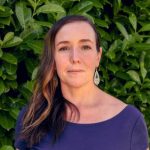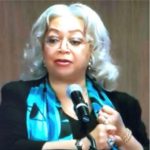Darryl Haddock
Atlanta, GA
This interview was conducted by Diana Toledo on January 21, 2022. Learn more about Darryl’s work at https://www.wawa-online.org/.
Transcript
You have been working for over two decades on environmental issues with a community-centered lens. What changes have you observed in how this type of work is valued and supported in the larger conservation landscape?
For the last two decades I focused on Proctor Creek, which is entirely situated inside the city of Atlanta. That affords us the opportunity to look at a single jurisdiction and a single government entity. But the other watersheds that we steward are multi-jurisdictional, so we have to work with the county and [multiple] municipalities. What I’ve noticed recently is that we’ve really seen these communities change, especially in terms of property and housing prices. Atlanta recently saw a population drop in the African American community. That influx of [new residents and] gentrification in town and the downtown neighborhoods of Atlanta have created new communication and outreach challenges because we’ve been so used to speaking to communities that look like us. We’ve got these new populations, some transplants from other cities, who are majority educated and wealthy white residents, and they’re communicating differently. For example, they use social media more than the legacy residents. It means that we have to be nimble and learn these new communication strategies. This creates a lot of stress and anxiety on legacy residents because there’s a difference in the financial and economic pressures on these two populations.
West Atlanta Watershed Alliance (WAWA) is an environmental justice organization that is trying to alleviate some of this tension, but this hasn’t historically been our wheelhouse. We have pivoted to providing food during the pandemic when we haven’t historically focused on food insecurity. With all these changes, we’ve had to take on more nuance in terms of how we serve communities.
Has WAWA’s shift toward a more nuanced approach to community- and needs-based work opened up doors with new funders and supporters?
Yes, this shift has helped us to have conversations with new funders and has also invited new interest in our Board. But we are still a community-centered organization and community-facing, so we have to do more to build muscle mass in understanding and talking to our new community members.
Are you finding other peers that are dealing with similar challenges like the shifting dynamics of their community?
Formally, WAWA is in another network: the Strong, Prosperous, And Resilient Communities Challenge (SPARCC), which is a national alliance of organizations that work more on energy, security, and transit-oriented development. We’re part of a green space and parks equity cohort; this allows us to engage with other cities. There are conversations bubbling up about how cities that are experiencing rapid gentrification are trying to navigate these tectonic shifts in the resources and policy dynamics. It would be great if we could have more spaces where we can come together and discuss how to address some of these new dynamics because gentrification, green gentrification in particular, seems to be more than just displacement.
WAWA’s mission statement is very clear about supporting and representing African American neighborhoods. WAWA sits at the intersection of environmental justice and water conservation, where groups have historically been white-dominated. Your visibility in these spaces have put you in an ambassadorial role that you may not have asked for. What are some of the challenges and benefits of being part of both of these communities independently?
Personally, I grew up in an integrated community. My parents moved to North New Jersey, a very urban environment, right as the Civil Rights movement was occurring. My mother was a school teacher in Montclair, a suburban community very much like Riverdale in the Archie Comics. Folks just believed that it was the archetypal American town. There was an interesting economic mix where folks on the southside might have worked in the houses of folks on the northside. All that to say, growing up in this community made me feel comfortable communicating in integrated spaces.
I even went to a predominantly white college—Jacksonville University—and again found myself part of a very small Black population, although I was still centered in my Afro-centricity. In my home, I had a deep relationship with my own Blackness even as I navigated very integrated external spaces. The ambassador role that you mentioned is not always comfortable, but also feels like something that I’ve done for a long time.
Fast-forwarding to now, I didn’t think about my experience being in both worlds as being privileged. When we started the Proctor Creek Ambassador work, I noticed that federal agencies tend to believe in this monolithic Black community. They expect certain narratives when we talk about policies and programs because of this widespread belief system. [Black leaders and agency staff] code switch. I think sometimes we’ve done a disservice in that integration: we haven’t called out the identities because we get along and the relationship is working. In terms of anti-racist opportunities, I’ve developed an understanding that you can bring those other identities into the room and that it will be necessary to do so if we’re really going to collaborate in a real and meaningful way.
How is this new understanding about authenticity and anti-racist opportunities showing up in your work now?
We have to be honest and authentic. For WAWA, even as we continue to work as the ambassador working with white-led organizations, we have to be honest about the fact that we’re still an African American, BIPOC-led organization and we intend to represent these neighborhoods. We sometimes get the question about reverse racism, this idea that because we’re African American we don’t want white staff and board members. In terms of being honest about our cultural identity and our corporate culture, we’re going to continue to lean in on the fact that we are African American scientists and educators who can work side-by-side with others, but we don’t need to water it down.
One thing we took away from The People’s Institute for Survival and Beyond is this idea of gatekeeping. They recognize that African Americans in leadership positions often find themselves gatekeeping for white organizations and resources, and that creates a duality. What they preach is that gatekeeping doesn’t have to be negative if it works two ways. We have to be honest about our position of privilege in being at the table, while sharing what’s at the table with folks who may not be in the room. The truth is that there’s no getting around the complexity of being a BIPOC-led organization who wants to work with allies who are white-led and resisting the pressure of taking on their leadership structures.
You’ve done work at the local level as well as this new national role as a trainer, examining the role of race in water and conservation issues. As you see more conservation organizations taking an interest in issues of race and water equity, does it feel like this shift is here to stay?
I’m optimistic and still holding my breath. WAWA has done trainings for federal agencies like National Park Service, Environmental Protection Agency, some Urban Waters Federal Partnership groups, so we hear a lot of perspectives and I still see sincere intent by many of our white professional peers. There is an interest to change from that early history [of conservation]. But I also see the embeddedness. Privilege is hard to recognize and break out of. For example, I was talking about development and equity language recently for organizations who want to be allies. People are still kind of holding onto language that centers equity, but they’re not pushing themselves to look at their equity vision statements; people are holding onto language that centers equality, but they’re not pushing themselves to think about movement threads that push the organization toward equity and eventually on to justice. To answer your question, I think we have to keep pushing because there’s a comfort level that, despite the good intentions, folks seem to fall back on.
How long have you been doing this work?
With WAWA, about 15 years because I was on the Board initially. Officially, we got our first environmental justice (EJ) grant from the EPA in 2006. When I moved to Atlanta I worked for the Department of Natural Resources, as an environmental scientist. Before that I was an environmental engineer for an engineering firm. I took off from that work to work a summer in Washington as an intern. There, I became pretty aware about environmental justice issues, right at the time that they were starting to plan the Environmental Leadership Summit. It really blows my mind that I’ve been in this work as far back as when I graduated from undergrad.
Burnout is very much a concern in this movement today. What has kept you motivated in this work?
I left environmental work to work at Delta Airlines, for example, for about eight years. I did IT work because I wanted a steady paycheck and healthcare. I thought “I can’t keep working off of grants.” Once I thought that I just needed to work at EPA. Interestingly, I became a consultant to EPA, perhaps because I didn’t get in, and became boxed in. Because I was always outside, perhaps that community perspective is something I’m able to share, because I have that lived experience. I feel that this work is just my ministry, it’s the work I’m meant to do. I thought that I would get my Master’s and perhaps a PhD and teach, shifting away from nonprofit work, but I realized that academia is not much more stable than the path I was currently on.
The training opportunity really just fell into my lap at [River] Rally. I worked with Jennifer Arnold [of Reciprocity Consulting] and learned some new skills, and it has been really exciting. I think as long as I’m not bored I can keep doing the work.
You’ve been part of the River Network family for forever and you’ve seen our work and River Rally evolve over the years. How has the work of the organization and River Rally changed?
River Network is now really embracing itself as a convener. The networking has been one of the most powerful things that I’ve experienced as a professional in this space. Without it, I don’t think these connections would be made as solidly. The interactions, friendships, and family life of Rally participants is almost unparalleled. I’ve asked about other spaces and conferences where people can connect in this way, producing this kind of family atmosphere, and it just doesn’t exist. Because environment tends to run more technical, they tend to have a different culture. I don’t know many environmental cohorts that feel so warm and fuzzy, if you will. It’s not easy to create that space and I want to recognize, in terms of resiliency, y’all have fought to bring people to the table, keep them at the table, and find funding for diverse groups. I don’t think a lot of organizations would dig that deep. WAWA has benefited because we’ve been able to watch and pick best practices from other organizations. For me, Rally is almost like a break because the work I do is so intense. Rally is the only time I can stop myself and talk and learn with other peers. I’ve started to need it as a means to take care of me, personally.
What advice would you give to a young person thinking about working in conservation and/or community activism?
You don’t have to follow the traditional path. My personal journey was traditional, but I’ve met people who love urban agriculture or want to work in sustainability who have not followed the traditional path of a four-year degree. Be okay with creating the experiences that you want to have. We’re kind of in this moment where we have a lot of people across the country who are exiting out of their corporate jobs because they want more freedom and independence. I would reinforce to young people this idea of leaning in on the experience as opposed to finding a pathway. Many of us found where we landed very serendipitously.
About
Darryl has over 20 years of professional experience as an environmental scientist working for the consulting firm, Dames and Moore, as a principal investigator with USGS on a subsurface mapping project and as Environmental Specialist for the State of Georgia, Environmental Protection Division. Both Environmental Leadership Program and Toyota Together Green/National Audubon Society recognized him as a fellow and emerging leader in the environment and conservation movements. He is also certified as a Project WET Trainer, an Interpretive Guide by the National Association for Interpretation, and is completing an Environmental Education certification program with Advanced Training for Environmental Education in Georgia (ATEEG); a nationally accredited, professional certification program for formal and non-formal educators. Darryl coordinates educational programs, community outreach, and citizen science research activities and participates in WAWA’s day to day operations.







